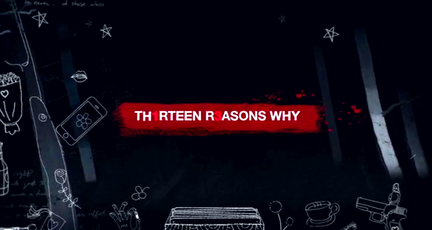PLEASE NOTE: If you experience suicidal thoughts or have lost someone to suicide, the following post could be potentially triggering. You can contact the Crisis Text Line by texting “START” to 741-741. You can also call 1-800-273-TALK (8255). The Alliance for Suicide Prevention offers local support in Larimer County.
The other day, I was scrolling through Facebook (something I am doing entirely too much of lately in my unemployment) and came across an article for The Mighty called "Why I Wish I Didn't Watch 13 Reasons Why."
I'd seen the trailer for the show on Netflix some time ago, but quickly forgot about it. This article revived my interest in the series, and because I am the obnoxious type who actually likes spoilers, I read the review first.
The author has some very valid concerns about the series, including:
- Abundant Triggers and Insufficient Warnings:
I will agree with this - the viewer discretion warnings did not occur until the last half of the series, for the episodes that portrayed sexual assault and/or the actual suicide taking place. Because teen suicide has a social contagion tendency, I think that parents must use extreme caution in sharing this series with their teens. Teens who are already struggling with mental health and/or social issues at school can be especially vulnerable to being triggered into a suicidal state. - Confirmation Bias:
Hannah Baker's thoughts mirrored those I have actually had when my depression has teetered me into dangerous territory: I do everything wrong, it will make my loved ones' lives better if I'm gone, etc. A person struggling with suicidal ideation could take those as validation for their hopelessness and cross the line from thinking to attempting - Mental Health is NOT Discussed:
Aside from a vague reference to Clay's pills he used to take for anxiety, the author is correct in that there is no attention drawn to underlying mental health issues - as often people at risk for suicide have depression, bipolar disorder, schizophrenia, or some other mental health diagnosis. That said, mental health in teen suicides is a different beast - many times no one has realized an onset of mental health issues until after an attempt is made.
Those things mentioned and given credence, I binge-watched the whole series in a little over a day; I'm unemployed, with kids at school all day and I stayed up quite late into the evening! I will say that I thought the series was very well-done and could be a powerful tool for parents to utilize with their teens, and not just for suicide awareness.
My kids lost a classmate who was just 13 and in 7th grade to suicide a few years ago. It happens far too soon.
My kids lost a classmate who was just 13 and in 7th grade to suicide a few years ago. It happens far too soon.
While watching the series with your teens (and yes, there are plenty of mature sexual and drug related scenes that many parents may be uncomfortable with - but you're kidding yourself if you think your 13 year olds are not already exposed to this), there are opportunities to pause and discuss the minor nuances of other topics like bullying, social media, consent, communication, etc., that might otherwise slip by.
Just a couple examples (contains spoiler alerts):
Consent
Clay and Sheri engage in a make-out session. As it advances from the initial kiss, Clay asks, "Is this ok?" and gets consent from Sheri that yes, this is what she wants also. Clay repeats this in the final episodes where it shows flashbacks of him with Hannah. At first, Hannah says yes, but then she has flashbacks of the unwanted sexual advances that have plagued her since the first episode, and abruptly changes her mind. Clay, while understandably confused and bewildered, accepts this.
This is HUGE! Like ZOMG! And such a contrast to the continuum of assaults made on the show. As parents, we must point these differences out and praise those rare examples of men seeking consent that occur in media, lest we end up with a generation of Brock Turners.
Trauma-Informed Communications
Multiple times in the series, high school boys say one thing, but Hannah hears a completely different implication as these conversations are filtered through her lens of betrayal, sexual assaults, and feelings of being only seen for one thing. In one such instance, Zach gets angry with her response after he proceeds to genuinely ask her out, and gets so butt-hurt that he not only lashes out at her, but continues to treat her maliciously. Had he been aware of the culminating effects of prior events (some of which he wouldn't have explicitly known about, like Jess' assumption that Hannah was a boyfriend stealing slut) and/or even had the maturity to realize her reaction didn't match his question, the whole string of events that later occurred with him could have been prevented.
We have to teach our kids that it isn't always about them and to avoid reacting hastily until they have the full picture. This one is a tall order for teens as they don't yet have fully-developed pre-frontal cortexes, but by giving them a teen-typical visual that speaks to their experiences and then walking through it with them, it may make them think more next time.
There are a lot of things that people could be wary of and opt out of watching the series for. But don't throw the baby out with the bathwater! I see 13 Reasons Why as a treasure trove of teachable moments for parents with teens. But due to its intense content and realistic portrayals, we ought to proceed with extreme caution and intentions of following up the episodes with some guided discussions.


No comments:
Post a Comment